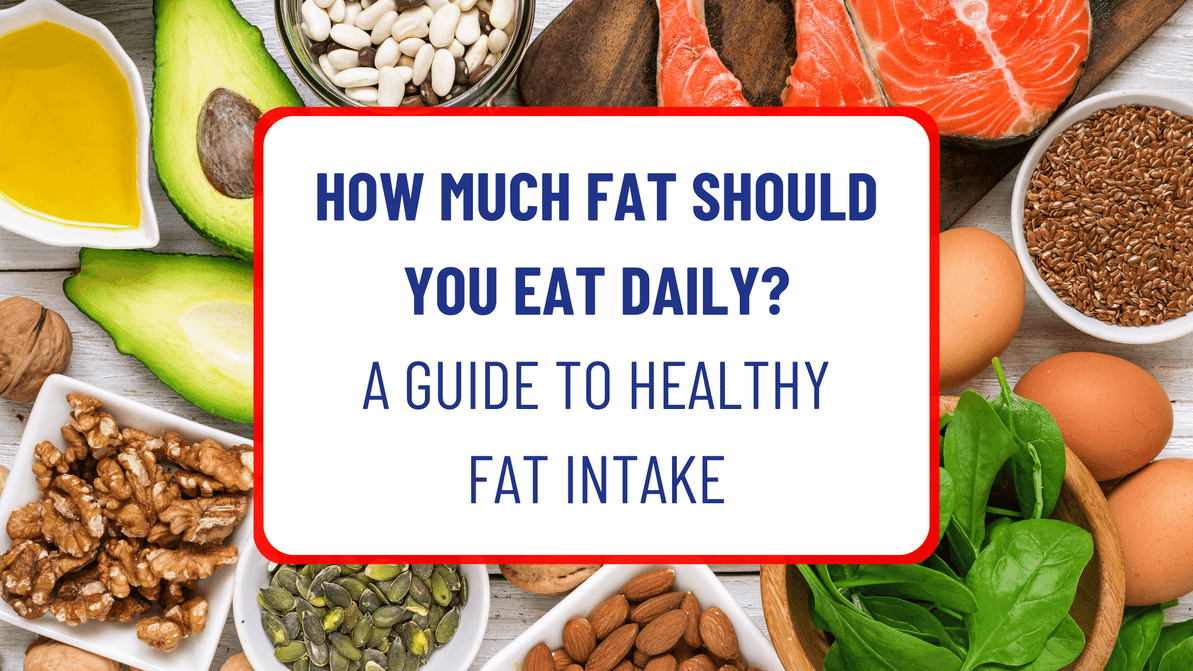How Much Fat Should You Eat Daily? A Guide to Healthy Fat Intake
A few years ago, someone created the tagline that took over the diet world—“you are what you eat.” People were quick to use it to demonize food groups. And the one that took the hardest hit was fat.
Since then, the discussion around fat has been anything but balanced. From people who want to cut it out entirely to those on keto, getting over 60% of their calories from fat, the debate around this topic is ever so strong. So how much fat should you eat daily? What’s the healthy balance? Let’s dive into this topic.
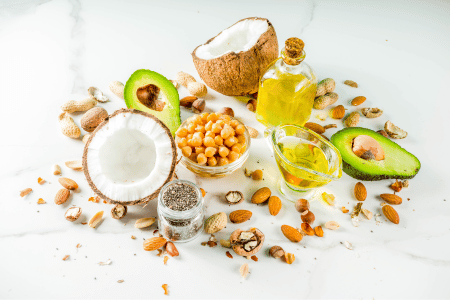
What is fat, and why do we need it?
Fat is one of the three macronutrients in your diet, along with carbohydrates and protein. It is more commonly associated with animal products, but plant-based foods can also give you plenty of fats.
You’re used to hearing bad things about it—but what are its benefits?
Fat is an incredible source of energy. One gram has 9 calories, while one gram of carbs has only 4. If you’re on a diet counting calories, that may sound bad. But calories are energy for the body, so fat can have a very energizing effect.
Fat helps with the absorption of certain vitamins. While many vitamins and minerals are water-soluble, some are fat-soluble. Examples include vitamins A, D, E, and K. Without fat, your body will have a hard time processing these vitamins, which puts you at risk for deficiencies.
Studies show fat is essential for hormone and gene regulation. Extremely low-fat diets, for instance, may lead to irregular or absent ovulation and amenorrhea.
Fat also plays an essential role in brain function, including mental health issues like depression and anxiety. A 2016 study had participants alternate between a low-fat diet, two diets rich in fats, and a control diet with balanced nutrients. Results showed participants had positive affect scores and were less irritable when eating one of the high-fat diets.
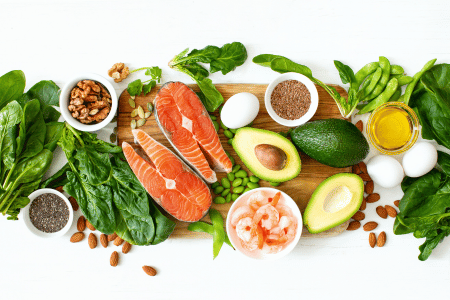
Types of fats
One thing is clear: fats are not all bad. But all the claims about the connection between fat and heart disease and obesity are not entirely false either. As with all things diet-related, moderation is key. But when talking about fats, their type plays an even more significant role. Some of them you want on your plate all the time, and others you should avoid as best as you can.
Monounsaturated fats
These are found mostly in plant-based foods, such as:
- Avocados
- Nuts and nut butter
- Olives
- Olive oil
- Seeds
These are the fats you want in your diet as often as possible, and studies link them to a decreased risk of diabetes and heart disease. Diets high in these fats can lower blood sugar levels, triglycerides, and blood pressure.
Polyunsaturated fats
These are also healthy fats in nuts, seeds, olive oil, and fish. Omega-3 and omega-6 fatty acids are polyunsaturated fat, and as you may already know, they have many health benefits.
They help fight inflammation and heart disease, boost brain function, improve mood, and more. Fatty fish is your best source of omega-3s, but if you don’t like it, have an allergy, or are vegan, supplementing can also help. Flax seeds, chia seeds, and walnuts are vegan alternatives that contain plenty of omega-3s as well.
Omega-6 is easier to get, as you’ll find it in sunflower, canola, and soybean oil. They’re not as healthy as omega-3 and can actually cause inflammation if eaten in excess.
Ideally, you want to balance the two, trying to get more omega-3 than omega-6 or at least a 1:1 ratio. Sadly, the standard diet will give you a ratio of up to 17:1 in favor of omega-6.
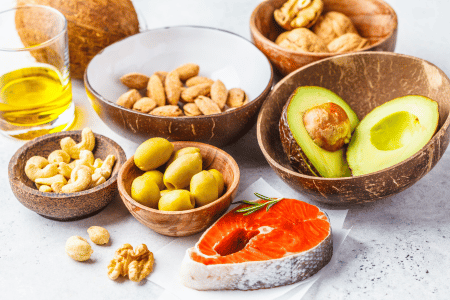
Saturated fat
You’ll find this type in animal products such as meat and dairy and more rarely in plant-based products such as coconut oil. They’re not all unhealthy. In fact, they may be better for cooking than polyunsaturated fats, which can be damaged at high heat.
But, with few exceptions, such as people with health conditions that may benefit from a keto diet, these fats shouldn’t make up most of your diet.
Their downsides are the ones you’re already familiar with. They may raise cholesterol levels and, with them, increase your risk for heart disease. In excess, they may also cause you to gain weight.
Do they have any benefits? Yes, they do. Saturated fats may positively affect your metabolic health, and some studies even suggest they don’t contribute to heart disease as much as previously thought.
The bottom line? Having some saturated fats in your diet is okay, but don’t make them your staple.
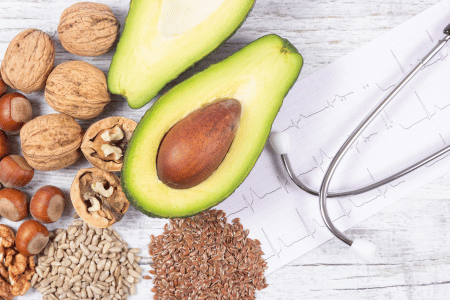
Trans fats
The last type of fat is also the one you want to avoid. Trans fats are primarily artificial, created through a process called hydrogenation used to turn liquid fats into solids. This process has been banned in the US, but you can still find trans fats in highly processed foods.
Some of them can occur naturally in meat or dairy, but the ones you’ll find in processed foods are anything but natural.
Why are they so bad? Because they raise LDL (“bad”) cholesterol while lowering HDL (“good”) cholesterol. They can also increase inflammation, lead to insulin resistance, impair artery function, and they’ll “help” you gain belly fat.
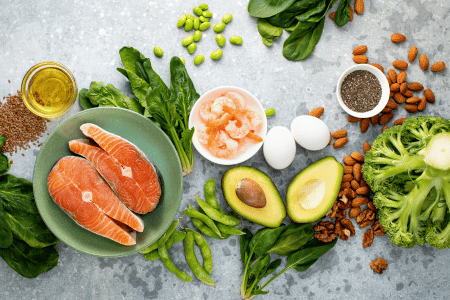
How much fat should you eat daily?
The answer depends on several factors, such as your diet, any medical conditions, goals, and the types of fats.
For example, according to the American Heart Association, you shouldn’t eat more than 5-6% saturated fats daily. For a standard 2,000-calorie diet, that’s about 13 grams.
In general, for someone healthy, without any health conditions or particular goals other than staying healthy, you’ll want about 30%-40% of your calories to come from fat. Most of them should come from monounsaturated and polyunsaturated fats.
Beyond this general recommendation, there are other factors involved. Do you have a health condition that requires you to limit fat? In this case, you’ll need to talk to a doctor to determine how much fat you can eat each day.
Or are you on the opposite spectrum, suffering from a condition such as epilepsy that could benefit from a high-fat diet? In this case, keto might be good for you, but again remember to talk to a doctor first.
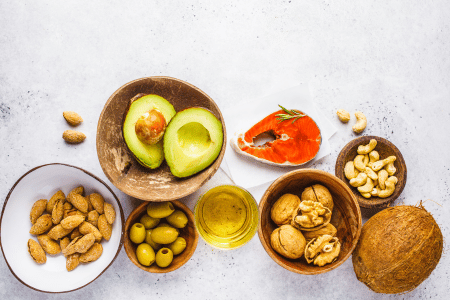
Fat and weight loss
Losing weight while eating fat still feels impossible to many people. And yet, the two can go together quite well.
Keto fans, for instance, will always talk about how much weight you can lose while getting over 60% of your calories from fat. While it’s true that keto has many benefits—which we covered in detail in a previous article—it’s not a diet for everyone.
It requires effort, is expensive, can have side effects, and you need to stick to it long-term if you want to see results. Sadly, it is also not easy to stick to, so you may want to think twice before trying it for weight loss.
On the other hand, one of the world's healthiest diets—the Mediterranean diet—comes with about 35-40% fat. Most of these come from healthy sources like olive oil, fatty fish, nuts, and seeds.
Outside keto and Paleo, the Mediterranean diet is one of the modern diets with the highest fat content. Why is it then considered one of the healthiest? On top of coming with a lot of good fats such as omega-3s, it also encourages eating a lot of vegetables, fruit, and whole, unprocessed foods.
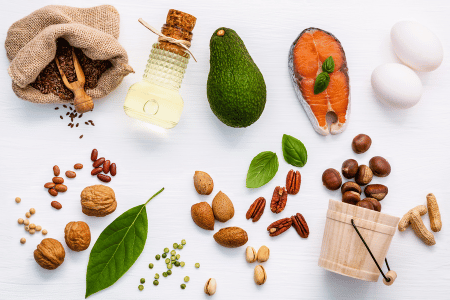
A word on low-fat diets
A diet is considered low in fat if fewer than 30% of your daily calories come from fats. Some diets take it to the extreme, allowing only 5-10% maximum.
These diets have some benefits, but they also come with many risks.
Regarding benefits, studies show they may help with heart health or diabetes. This is especially true in those who are already suffering from issues like high cholesterol or triglycerides.
Extremely low-fat diets may also help people with multiple sclerosis (MS). One study started in 1948 followed the evolution of 150 people with MS for 50 years.
The results showed those who adhered to the low-fat diet saw a slower disease progression. By the end of the study, 31% of those who had followed the diet had died, as opposed to 80% from the group who hadn’t.
Beyond specific conditions, though, an extremely low-fat diet has few benefits, is hard to stay on, and puts you at risk for depression and anxiety. Your body may also have difficulty absorbing fat-soluble vitamins, which can come with deficiencies and other health issues.
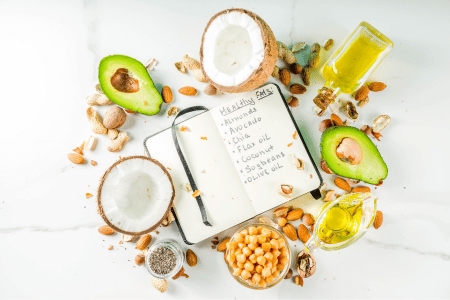
The bottom line
“You are what you eat” is not an all-encompassing truth. And it is certainly false when it comes to fat.
This demonized macronutrient can be very healthy when eaten in moderation. Fats from plant-based sources or fatty fish are the best; you can include them on your plate daily.
Saturated fat, which comes from animal products, should be rarer in your diet. You don’t need to take it out entirely unless you have a medical condition requiring a low-fat diet or at least avoiding animal products.
If you’re healthy and eat a whole foods diet, you can get as much as 35-40% of calories from fats. Otherwise, adapt according to your body’s needs and talk to a doctor when in doubt.
Did you learn something new from this article? Help us spread the knowledge by sharing it with your friends.
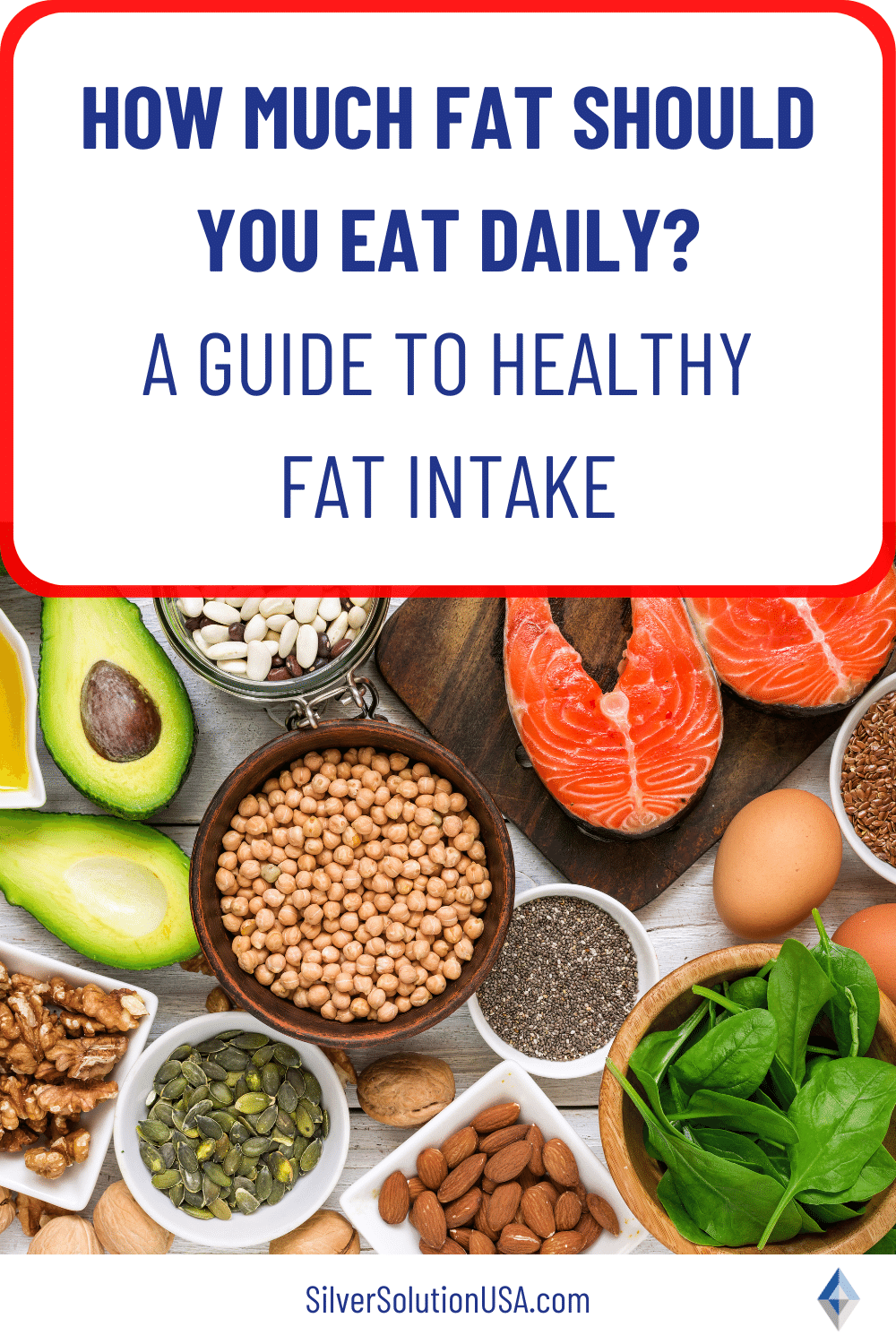
Health/Medical Disclaimer
This blog post does not provide health or medical advice. This blog post is for informational and educational purposes only and is not a substitute for professional health or medical advice. Before taking any actions based upon such information, we encourage you to consult with the appropriate medical and healthcare professionals. We do not provide any kind of health or medical advice. The use or reliance of any information contained on this blog is solely at your own risk.
Sources
https://www.ncbi.nlm.nih.gov/pmc/articles/PMC9675098/
https://www.ncbi.nlm.nih.gov/pmc/articles/PMC6470599/
https://pubmed.ncbi.nlm.nih.gov/27412317/
https://www.ncbi.nlm.nih.gov/pmc/articles/PMC4879159/
https://pubmed.ncbi.nlm.nih.gov/17045449/
https://www.ncbi.nlm.nih.gov/pmc/articles/PMC3191260/
https://pubmed.ncbi.nlm.nih.gov/27355649/
Recent Posts
-
Are sunscreen ingredients harmful?
Sunny days can bring a lot of fun. Going out for a swim, spending time in nature, or relaxing on the …18th Mar 2024 -
The Veggie Debate: Does Cooking Vegetables Destroy Nutrients and the Best Ways to Cook Them
Vegetables are one of the healthiest foods you can choose. Some people downright hate them, while so …4th Mar 2024 -
Best Foods for COVID Recovery and Prevention
A few years ago, a new virus took the world by surprise. COVID-19 may look like the flu on the surfa …19th Feb 2024

